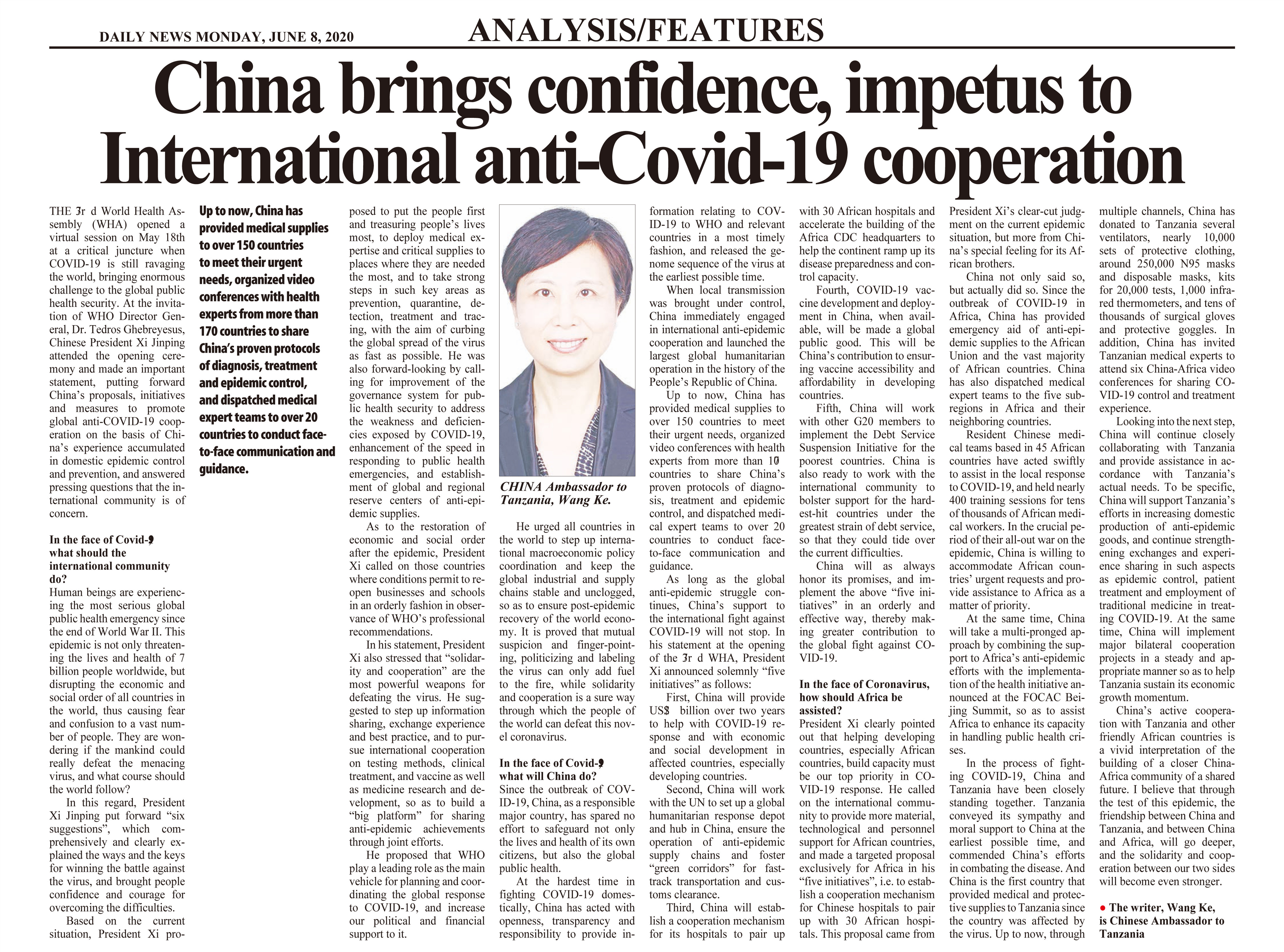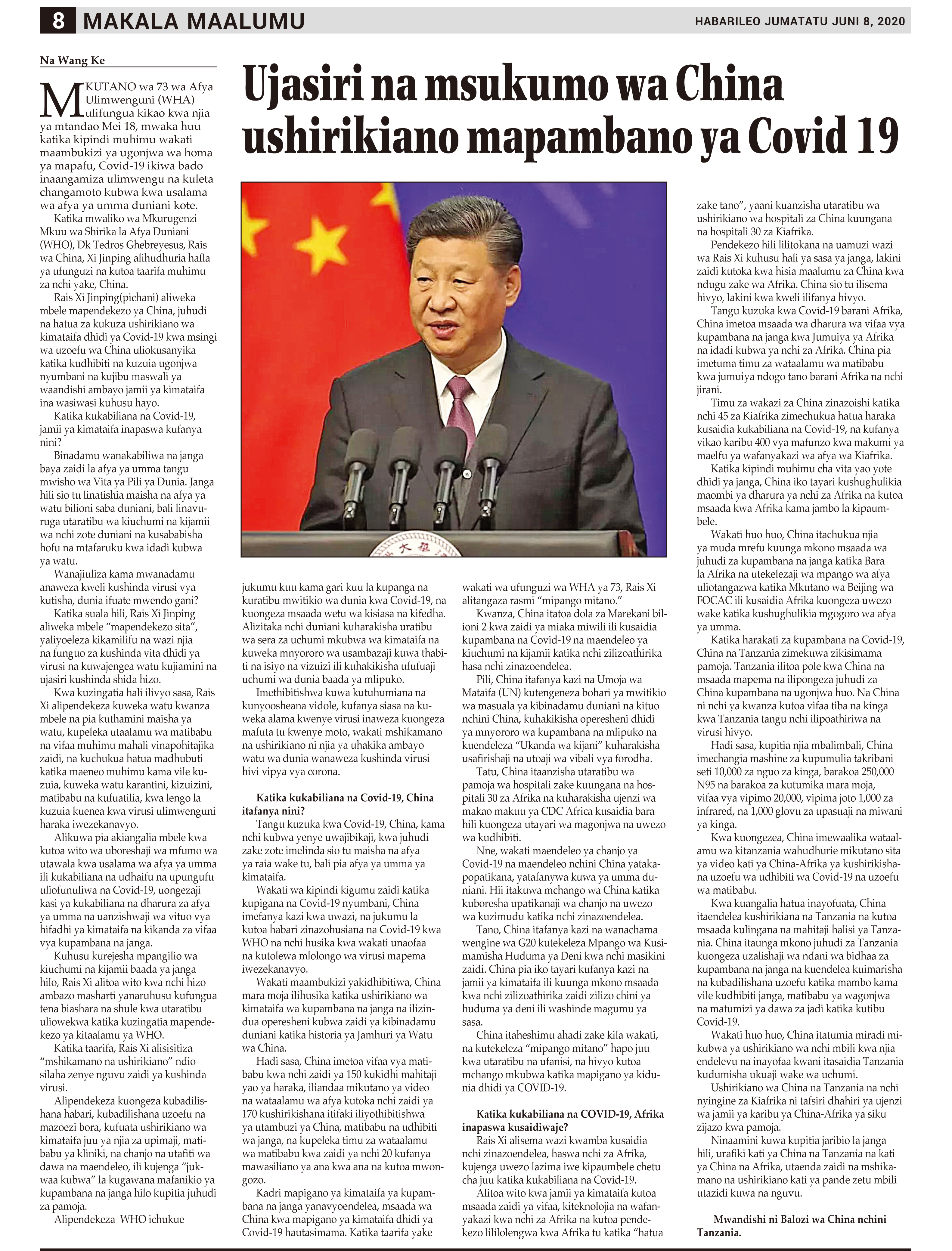On 8 June, Chinese Ambassador to Tanzania H.E. Wang Ke published an article titled “China brings confidence and impetus to international anti-COVID-19 cooperation” on Daily News and Habari Leo to expound on Chinese President Xi Jinping’s statement at virtual event of opening of the 73rd World Health Assembly. She pointed out that President Xi’s statement put forward China’s proposals, initiatives and measures to promote global anti-COVID-19 cooperation on the basis of China’s experience accumulated in domestic epidemic control and prevention, and answered pressing questions that the international community is of concern. The full text of the article is as follows:


The 73rd World Health Assembly (WHA) opened a virtual session on May 18th at a critical juncture when COVID-19 is still ravaging the world, bringing enormous challenge to the global public health security. At the invitation of WHO Director General Dr. Tedros Ghebreyesus, Chinese President Xi Jinping attended the opening ceremony and made an important statement, putting forward China’s proposals, initiatives and measures to promote global anti-COVID-19 cooperation on the basis of China’s experience accumulated in domestic epidemic control and prevention, and answered pressing questions that the international community is of concern.
In the face of COVID-19, what should the international community do?
Human beings are experiencing the most serious global public health emergency since the end of World War II. This epidemic is not only threatening the lives and health of 7 billion people worldwide, but disrupting the economic and social order of all countries in the world, thus causing fear and confusion to a vast number of people. They are wondering if the mankind could really defeat the menacing virus, and what course should the world follow?
In this regard, President Xi Jinping put forward “six suggestions”, which comprehensively and clearly explained the ways and the keys for winning the battle against the virus, and brought people confidence and courage for overcoming the difficulties. Based on the current situation, President Xi proposed to put the people first and treasuring people’s lives most, to deploy medical expertise and critical supplies to places where they are needed the most, and to take strong steps in such key areas as prevention, quarantine, detection, treatment and tracing, with the aim of curbing the global spread of the virus as fast as possible. He was also forward-looking by calling for improvement of the governance system for public health security to address the weakness and deficiencies exposed by COVID-19, enhancement of the speed in responding to public health emergencies, and establishment of global and regional reserve centers of anti-epidemic supplies. As to the restoration of economic and social order after the epidemic, President Xi called on those countries where conditions permit to reopen businesses and schools in an orderly fashion in observance of WHO’s professional recommendations.
In his statement, President Xi also stressed that “solidarity and cooperation” are the most powerful weapons for defeating the virus. He suggested to step up information sharing, exchange experience and best practice, and to pursue international cooperation on testing methods, clinical treatment, and vaccine as well as medicine research and development, so as to build a “big platform” for sharing anti-epidemic achievements through joint efforts. He proposed that WHO play a leading role as the main vehicle for planning and coordinating the global response to COVID-19, and increase our political and financial support to it. He urged all countries in the world to step up international macroeconomic policy coordination and keep the global industrial and supply chains stable and unclogged, so as to ensure post-epidemic recovery of the world economy. It is proved that mutual suspicion and finger-pointing, politicizing and labeling the virus can only add fuel to the fire, while solidarity and cooperation is a sure way through which the people of the world can defeat this novel coronavirus.
In the face of COVID-19, what will China do?
Since the outbreak of COVID-19, China, as a responsible major country, has spared no effort to safeguard not only the lives and health of its own citizens, but also the global public health.
At the hardest time in fighting COVID-19 domestically, China has acted with openness, transparency and responsibility to provide information relating to COVID-19 to WHO and relevant countries in a most timely fashion, and released the genome sequence of the virus at the earliest possible time. When local transmission was brought under control, China immediately engaged in international anti-epidemic cooperation and launched the largest global humanitarian operation in the history of the People’s Republic of China. Up to now, China has provided medical supplies to over 150 countries to meet their urgent needs, organized video conferences with health experts from more than 170 countries to share China’s proven protocols of diagnosis, treatment and epidemic control, and dispatched medical expert teams to over 20 countries to conduct face-to-face communication and guidance.
As long as the global anti-epidemic struggle continues, China’s support to the international fight against COVID-19 will not stop. In his statement at the opening of the 73rd WHA, President Xi announced solemnly “five initiatives” as follows:
First, China will provide US$2 billion over two years to help with COVID-19 response and with economic and social development in affected countries, especially developing countries.
Second, China will work with the UN to set up a global humanitarian response depot and hub in China, ensure the operation of anti-epidemic supply chains and foster “green corridors” for fast-track transportation and customs clearance.
Third, China will establish a cooperation mechanism for its hospitals to pair up with 30 African hospitals and accelerate the building of the Africa CDC headquarters to help the continent ramp up its disease preparedness and control capacity.
Fourth, COVID-19 vaccine development and deployment in China, when available, will be made a global public good. This will be China’s contribution to ensuring vaccine accessibility and affordability in developing countries.
Fifth, China will work with other G20 members to implement the Debt Service Suspension Initiative for the poorest countries. China is also ready to work with the international community to bolster support for the hardest-hit countries under the greatest strain of debt service, so that they could tide over the current difficulties.
China will as always honor its promises, and implement the above “five initiatives” in an orderly and effective way, thereby making greater contribution to the global fight against COVID-19.
In the face of COVID-19, how should Africa be assisted?
President Xi clearly pointed out that helping developing countries, especially African countries, build capacity must be our top priority in COVID-19 response. He called on the international community to provide more material, technological and personnel support for African countries, and made a targeted proposal exclusively for Africa in his “five initiatives”, i.e. to establish a cooperation mechanism for Chinese hospitals to pair up with 30 African hospitals. This proposal came from President Xi’s clear-cut judgment on the current epidemic situation, but more from China’s special feeling for its African brothers.
China not only said so, but actually did so. Since the outbreak of COVID-19 in Africa, China has provided emergency aid of anti-epidemic supplies to the African Union and the vast majority of African countries. China has also dispatched medical expert teams to the five sub-regions in Africa and their neighboring countries. Resident Chinese medical teams based in 45 African countries have acted swiftly to assist in the local response to COVID-19, and held nearly 400 training sessions for tens of thousands of African medical workers. In the crucial period of their all-out war on the epidemic, China is willing to accommodate African countries’ urgent requests and provide assistance to Africa as a matter of priority. At the same time, China will take a multi-pronged approach by combining the support to Africa’s anti-epidemic efforts with the implementation of the health initiative announced at the FOCAC Beijing Summit, so as to assist Africa to enhance its capacity in handling public health crises.
In the process of fighting COVID-19, China and Tanzania have been closely standing together. Tanzania conveyed its sympathy and moral support to China at the earliest possible time, and commended China’s efforts in combating the disease. And China is the first country that provided medical and protective supplies to Tanzania since the country was affected by the virus. Up to now, through multiple channels, China has donated to Tanzania several ventilators, nearly 10,000 sets of protective clothing, around 250,000 N95 masks and disposable masks, kits for 20,000 tests, 1,000 infrared thermometers, and tens of thousands of surgical gloves and protective goggles. In addition, China has invited Tanzanian medical experts to attend six China-Africa video conferences for sharing COVID-19 control and treatment experience.
Looking into the next step, China will continue closely collaborating with Tanzania and provide assistance in accordance with Tanzania’s actual needs. To be specific, China will support Tanzania’s efforts in increasing domestic production of anti-epidemic goods, and continue strengthening exchanges and experience sharing in such aspects as epidemic control, patient treatment and employment of traditional medicine in treating COVID-19. At the same time, China will implement major bilateral cooperation projects in a steady and appropriate manner so as to help Tanzania sustain its economic growth momentum.
China’s active cooperation with Tanzania and other friendly African countries is a vivid interpretation of the building of a closer China-Africa community of a shared future. I believe that through the test of this epidemic, the friendship between China and Tanzania, and between China and Africa, will go deeper, and the solidarity and cooperation between our two sides will become even stronger.